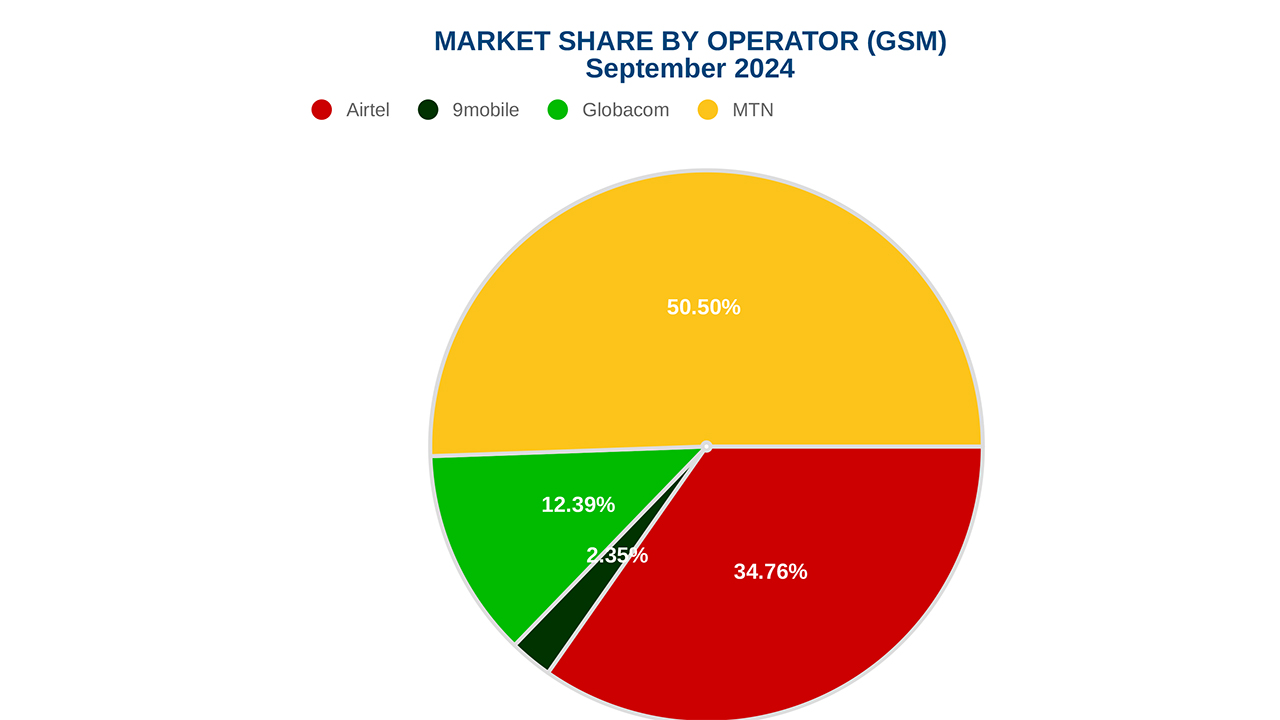The Nigerian Communications Commission (NCC) is on the verge of conducting a new study to determine the level of market share of operators in Nigeria’s $76 billion telecoms sector.
The NCC made a plan for a new dominance study known at a forum in Lagos. The Guardian noted that dominance in the Nigerian telecommunications sector refers to a market situation where a company has the economic strength to prevent other companies from competing effectively.
The NCC can direct a dominant licensee to stop actions that may weaken competition in the market. While the last study was done a decade ago, dominance study helped to know the market share (a large market share, especially if it is stable over time, may indicate dominance. However, a low market share doesn’t rule out the possibility of dominance); financial power (it looks at the economic power of the company); access to suppliers and market (the company’s access to suppliers and markets); barriers to market entry (legal or other barriers that prevent other companies from entering the market) and competition (the level of competition from other companies, both within and outside the industry).
In 2013, MTN Nigeria and Globacom were dominant players, following a market analysis conducted by KPMG Professional Services. MTN was declared a dominant operator in the mobile voice market, wholesale leased lines, and transmission capacity. Glo was declared dominant in the wholesale leased lines and transmission capacity market.
On the need for a new study, NCC at the Lagos forum said the study is needed because of the fast-changing and evolving landscape, stressing that there was also the need to guard against cases of monopoly and arbitrary price fixing in the sector.
Analysts posited that dominant companies are generally considered bad for consumers and the economy. When markets are dominated by one or a few players, there’s a danger that these players can abuse their power to eventually increase prices to customers or reduce quality to increase profits. This kind of excessive market power can also lead to less innovation, losses in quality, stifling local entrepreneurship and higher inflation. Dominant companies can also influence the market’s direction to favour their profits above all.
“For instance, a firm with deep pockets can set prices below costs and absorb losses until competitors can no longer survive. Then, once the competition is eliminated, the surviving firm can raise prices high enough to more than cover the losses it took while establishing its now-dominant market position,” said Kehinde Aluko, a telecoms analyst.
But the NCC noted that the issue about dominance speaks largely about obligations, saying, “When you are a dominant operator, nobody should stop you from increasing your dominance, what the rule of the game says is that such a player will be guided by certain conditions. One that will make the player take more responsibilities in that dominance, including increasing the volume of infrastructure to be deployed, among others.
“Largely, dominance is not punishment, it simply means you take more responsibilities, and such players would be watched to ensure that it does not display anti-competitive tendencies.”
Coming from the position of authority, NCC said it derived its power from the Nigeria Communications Act 2003, stressing that everything it does is embedded in the Act. It stressed that for licensees, there is a competition regulation, saying every operation of the service providers is governed by that regulation and is not expected to flout the orders.
The Commission noted that one of the pillars of the new EVC is to ensure that operators comply with the rules and regulations of the sector. We try as much as possible to monitor every anti-competitive behaviour in the sector.
Indeed, the NIN-SIM audit has helped to sanitise and provide a vivid status of the sector and revealed the current subscription status of players, especially the mobile network operators (MNOs).
For instance, from 219 million active subscriptions in March, it dropped to 154 million by September. The data also helped to show the current capacity of the MNOs. With the sanitisation and pruning exercise on the telecom operators’ databases, MTN Nigeria still maintained its top spot in the market with 78 million active subscriptions as of September. The company, however, also lost 3.7 million subscriptions to the exercise as its active subscriptions database stood at 81.7 million in March.
Airtel Nigeria, which occupies the second position, ended September with 53.7 million active subscriptions. The telco also lost about 9.6 million subscriptions over the last six months bringing its database down from the 63.3 million it recorded in March.
Globacom, which had 62.1 million active subscriptions as of March was left with 19.1 million subscriptions at the end of September, losing a whopping 43 million subscriptions. Similarly, 9mobile, which had lost numerous customers in the past years, was left with only 3.6 million active subscriptions at the end of September.






